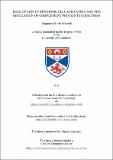Files in this item
Role of zinc in dendritic cell activation and the regulation of complement protein interactions
Item metadata
| dc.contributor.advisor | Stewart, Alan J. | |
| dc.contributor.advisor | Powis, Simon John | |
| dc.contributor.author | Wiatrek, Dagmara Marta | |
| dc.coverage.spatial | xi, 194 p. | en_US |
| dc.date.accessioned | 2017-05-23T14:42:41Z | |
| dc.date.available | 2017-05-23T14:42:41Z | |
| dc.date.issued | 2017-06-23 | |
| dc.identifier.uri | https://hdl.handle.net/10023/10813 | |
| dc.description.abstract | The importance of zinc in immune system is complex and recognised mostly by the effects of zinc deficiency which affects both innate and adaptive immunity. The results presented here provided insight into the complex role of zinc in immunity through examination of the roles of zinc in dendritic cell activation and regulation of complement protein interactions. Little is known about the mechanism by which zinc affects immune cell function. Here we show that Toll-like receptor 4 signalling upon lipopolysaccharide (LPS) binding, alters the expression of zinc transporters, to maintain the stable intracellular free zinc. This indicates the importance of zinc on every level of dendritic cells (DCs) maturation, beginning with antigen recognition, through antigen processing and cell migration to the lymphatic organs, to finally antigen presentation to T-cells. Hydroxyapatite along with LPS can trigger DCs maturation. Following this finding we presented a global picture of proteomic changes that occur in maturing DCs, which was characterised by reduced expression of proteins that drive cellular processes including metabolism and protein translation. Proteomic results may also change the current understanding of antigen presentation by DCs, implicating major histocompatibility complex (MHC) class I in “delayed” antigen presentation. Zinc is also crucial in innate immunity as it inhibits the interaction of complement proteins C1q, Factor H and C3 with histidine rich glycoprotein (HRG). The results suggest for the first time, that binding of complement proteins to HRG is not solely dependent on the N-terminus. Also the role of zinc in the early onset of diseases related to tissue calcification was examined, showing its enhancing effect on HRG binding to hydroxyapatite. | en |
| dc.language.iso | en | en_US |
| dc.publisher | University of St Andrews | |
| dc.rights | Attribution-NonCommercial-NoDerivatives 4.0 International | * |
| dc.rights.uri | http://creativecommons.org/licenses/by-nc-nd/4.0/ | * |
| dc.subject | Zinc | en |
| dc.subject | Innate immune system | en |
| dc.subject | Dendritic cell | en |
| dc.subject | Complement system | en |
| dc.subject | Factor H | en |
| dc.subject | Histidine-rich glycoprotein | en |
| dc.subject.lcc | QR185.8D45W5 | |
| dc.subject.lcsh | Dendritic cells | en |
| dc.subject.lcsh | Zinc--Physiological effect | en |
| dc.subject.lcsh | Immune system | en |
| dc.subject.lcsh | Glycoproteins | en |
| dc.title | Role of zinc in dendritic cell activation and the regulation of complement protein interactions | en_US |
| dc.type | Thesis | en_US |
| dc.contributor.sponsor | Wellcome Trust | en_US |
| dc.contributor.sponsor | University of St Andrews. School of Medicine | en_US |
| dc.type.qualificationlevel | Doctoral | en_US |
| dc.type.qualificationname | PhD Doctor of Philosophy | en_US |
| dc.publisher.institution | The University of St Andrews | en_US |
The following licence files are associated with this item:
This item appears in the following Collection(s)
Except where otherwise noted within the work, this item's licence for re-use is described as Attribution-NonCommercial-NoDerivatives 4.0 International
Items in the St Andrews Research Repository are protected by copyright, with all rights reserved, unless otherwise indicated.


